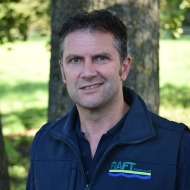
Dr Jonathan Statham will bring expertise to UK's newest vet school
Harper and Keele Veterinary School has announced the appointment of Dr Jonathan Statham MRCVS as Professor of Sustainable Livestock Health and Welfare.
Dr Statham is an RCVS Recognised Specialist in Cattle Health and Production, as well as chair of Bishopton Veterinary Group and CEO of Raft Solutions Ltd, an innovative veterinary research & consultancy company.
He is currently a member of the Animal Health & Welfare Board of England (AHWBE) and was previously president of the British Cattle Veterinary Association (BCVA).
Recently, Dr Statham gave a presentation at the United Nations Climate Change COP25 Conference in Madrid. He also gave an invited lecture tour in North America, presenting the work of both RAFT and it's collaborating partners.
Dr Statham will work with Harper and Keele to integrate sustainability into the teaching of production animal studies across the school's five-year programme. He will also be bringing his clinical and industry expertise to current and future research at both Harper Adams and Keele universities.
Commenting on his appointment as chair, Dr Statham said: “Sustainable livestock health and welfare is of critical importance as we strive to understand and manage the challenges presented by food security alongside mitigating the impacts on our environment.
“Veterinary surgeons working in effective partnership with our farming clients offer a vital role in managing this fundamental balance.
“Scientific evidence is essential in finding an effectively sustainable way forward and equipping the veterinary surgeons and farmers of the future with this evidence base and skills starting from their very first days at Harper-Keele is an enormous opportunity.”
Image (c) Harper and Keele Veterinary School.



 The latest
The latest